Bilgehan Sel
Backtracking for Safety
Mar 11, 2025Abstract:Large language models (LLMs) have demonstrated remarkable capabilities across various tasks, but ensuring their safety and alignment with human values remains crucial. Current safety alignment methods, such as supervised fine-tuning and reinforcement learning-based approaches, can exhibit vulnerabilities to adversarial attacks and often result in shallow safety alignment, primarily focusing on preventing harmful content in the initial tokens of the generated output. While methods like resetting can help recover from unsafe generations by discarding previous tokens and restarting the generation process, they are not well-suited for addressing nuanced safety violations like toxicity that may arise within otherwise benign and lengthy generations. In this paper, we propose a novel backtracking method designed to address these limitations. Our method allows the model to revert to a safer generation state, not necessarily at the beginning, when safety violations occur during generation. This approach enables targeted correction of problematic segments without discarding the entire generated text, thereby preserving efficiency. We demonstrate that our method dramatically reduces toxicity appearing through the generation process with minimal impact to efficiency.
Safe and Balanced: A Framework for Constrained Multi-Objective Reinforcement Learning
May 26, 2024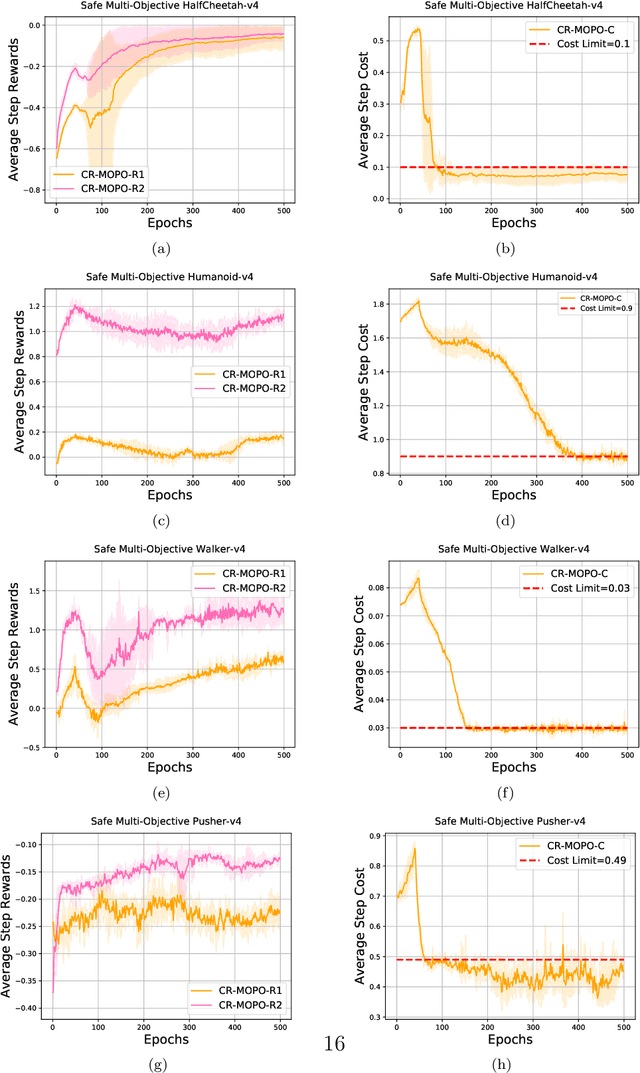
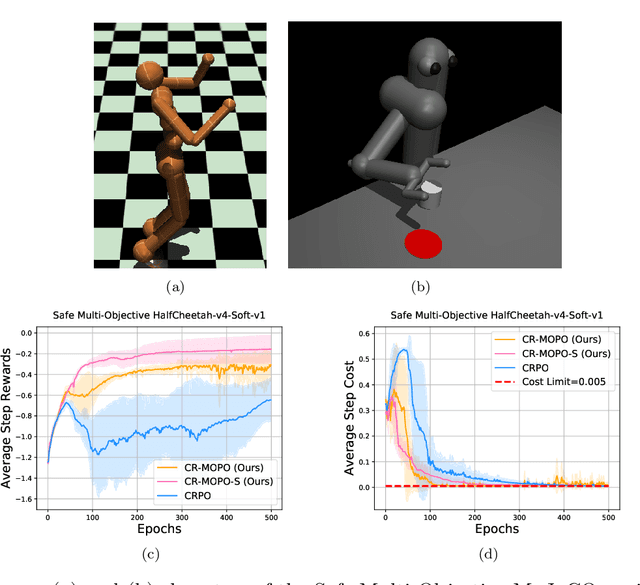
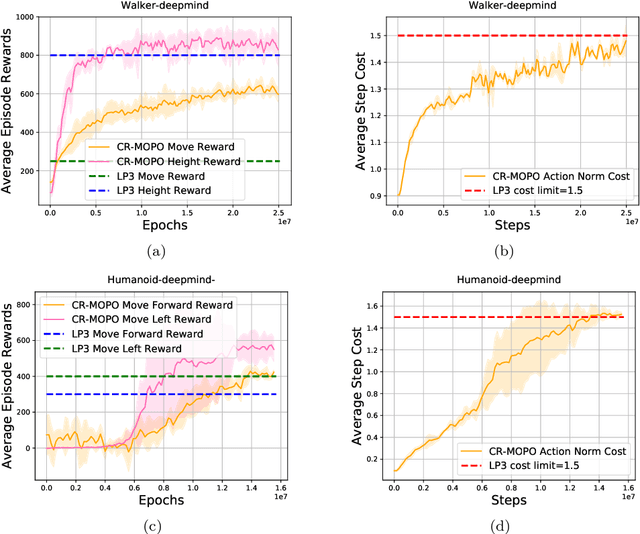
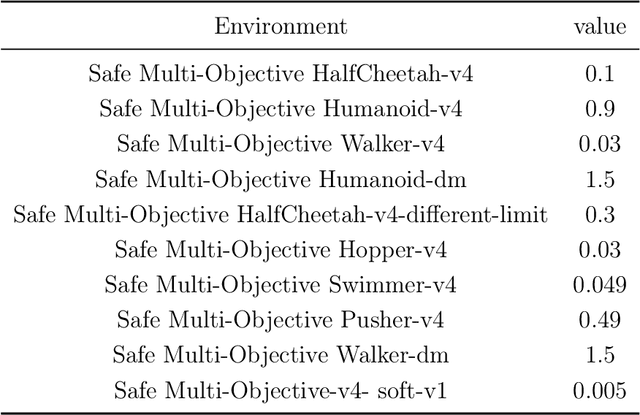
Abstract:In numerous reinforcement learning (RL) problems involving safety-critical systems, a key challenge lies in balancing multiple objectives while simultaneously meeting all stringent safety constraints. To tackle this issue, we propose a primal-based framework that orchestrates policy optimization between multi-objective learning and constraint adherence. Our method employs a novel natural policy gradient manipulation method to optimize multiple RL objectives and overcome conflicting gradients between different tasks, since the simple weighted average gradient direction may not be beneficial for specific tasks' performance due to misaligned gradients of different task objectives. When there is a violation of a hard constraint, our algorithm steps in to rectify the policy to minimize this violation. We establish theoretical convergence and constraint violation guarantees in a tabular setting. Empirically, our proposed method also outperforms prior state-of-the-art methods on challenging safe multi-objective reinforcement learning tasks.
A CMDP-within-online framework for Meta-Safe Reinforcement Learning
May 26, 2024



Abstract:Meta-reinforcement learning has widely been used as a learning-to-learn framework to solve unseen tasks with limited experience. However, the aspect of constraint violations has not been adequately addressed in the existing works, making their application restricted in real-world settings. In this paper, we study the problem of meta-safe reinforcement learning (Meta-SRL) through the CMDP-within-online framework to establish the first provable guarantees in this important setting. We obtain task-averaged regret bounds for the reward maximization (optimality gap) and constraint violations using gradient-based meta-learning and show that the task-averaged optimality gap and constraint satisfaction improve with task-similarity in a static environment or task-relatedness in a dynamic environment. Several technical challenges arise when making this framework practical. To this end, we propose a meta-algorithm that performs inexact online learning on the upper bounds of within-task optimality gap and constraint violations estimated by off-policy stationary distribution corrections. Furthermore, we enable the learning rates to be adapted for every task and extend our approach to settings with a competing dynamically changing oracle. Finally, experiments are conducted to demonstrate the effectiveness of our approach.
Skin-in-the-Game: Decision Making via Multi-Stakeholder Alignment in LLMs
May 21, 2024



Abstract:Large Language Models (LLMs) have shown remarkable capabilities in tasks such as summarization, arithmetic reasoning, and question answering. However, they encounter significant challenges in the domain of moral reasoning and ethical decision-making, especially in complex scenarios with multiple stakeholders. This paper introduces the Skin-in-the-Game (SKIG) framework, aimed at enhancing moral reasoning in LLMs by exploring decisions' consequences from multiple stakeholder perspectives. Central to SKIG's mechanism is simulating accountability for actions, which, alongside empathy exercises and risk assessment, is pivotal to its effectiveness. We validate SKIG's performance across various moral reasoning benchmarks with proprietary and opensource LLMs, and investigate its crucial components through extensive ablation analyses.
Balance Reward and Safety Optimization for Safe Reinforcement Learning: A Perspective of Gradient Manipulation
May 02, 2024



Abstract:Ensuring the safety of Reinforcement Learning (RL) is crucial for its deployment in real-world applications. Nevertheless, managing the trade-off between reward and safety during exploration presents a significant challenge. Improving reward performance through policy adjustments may adversely affect safety performance. In this study, we aim to address this conflicting relation by leveraging the theory of gradient manipulation. Initially, we analyze the conflict between reward and safety gradients. Subsequently, we tackle the balance between reward and safety optimization by proposing a soft switching policy optimization method, for which we provide convergence analysis. Based on our theoretical examination, we provide a safe RL framework to overcome the aforementioned challenge, and we develop a Safety-MuJoCo Benchmark to assess the performance of safe RL algorithms. Finally, we evaluate the effectiveness of our method on the Safety-MuJoCo Benchmark and a popular safe benchmark, Omnisafe. Experimental results demonstrate that our algorithms outperform several state-of-the-art baselines in terms of balancing reward and safety optimization.
A Human-on-the-Loop Optimization Autoformalism Approach for Sustainability
Aug 23, 2023Abstract:This paper outlines a natural conversational approach to solving personalized energy-related problems using large language models (LLMs). We focus on customizable optimization problems that necessitate repeated solving with slight variations in modeling and are user-specific, hence posing a challenge to devising a one-size-fits-all model. We put forward a strategy that augments an LLM with an optimization solver, enhancing its proficiency in understanding and responding to user specifications and preferences while providing nonlinear reasoning capabilities. Our approach pioneers the novel concept of human-guided optimization autoformalism, translating a natural language task specification automatically into an optimization instance. This enables LLMs to analyze, explain, and tackle a variety of instance-specific energy-related problems, pushing beyond the limits of current prompt-based techniques. Our research encompasses various commonplace tasks in the energy sector, from electric vehicle charging and Heating, Ventilation, and Air Conditioning (HVAC) control to long-term planning problems such as cost-benefit evaluations for installing rooftop solar photovoltaics (PVs) or heat pumps. This pilot study marks an essential stride towards the context-based formulation of optimization using LLMs, with the potential to democratize optimization processes. As a result, stakeholders are empowered to optimize their energy consumption, promoting sustainable energy practices customized to personal needs and preferences.
Algorithm of Thoughts: Enhancing Exploration of Ideas in Large Language Models
Aug 20, 2023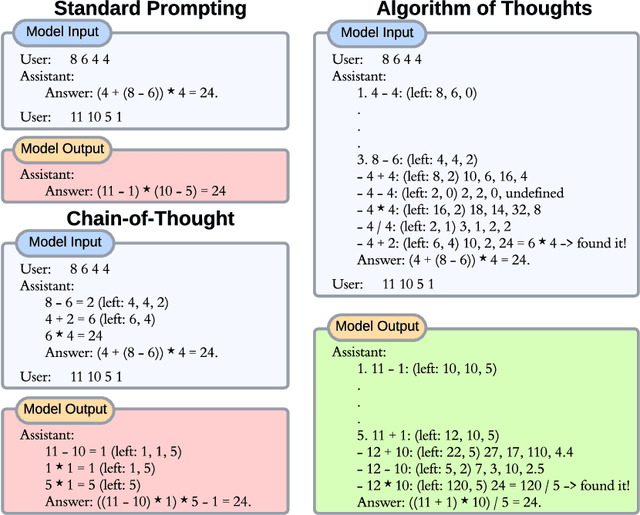
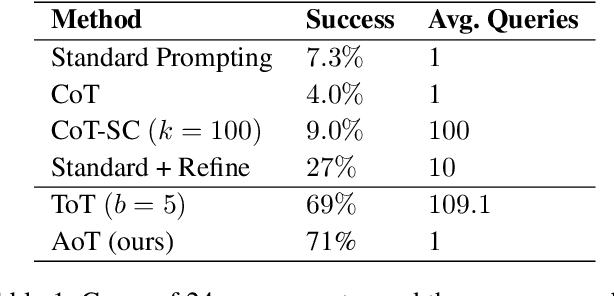
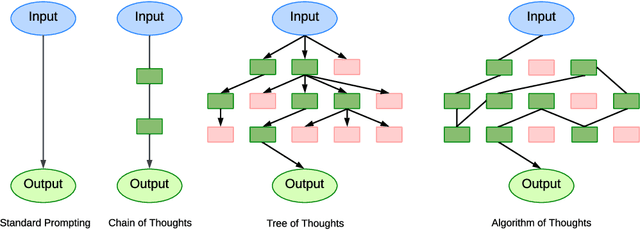
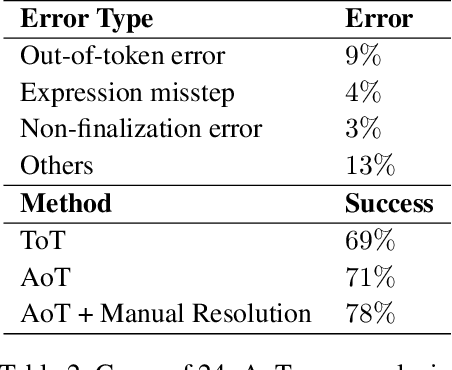
Abstract:Current literature, aiming to surpass the "Chain-of-Thought" approach, often resorts to an external modus operandi involving halting, modifying, and then resuming the generation process to boost Large Language Models' (LLMs) reasoning capacities. This mode escalates the number of query requests, leading to increased costs, memory, and computational overheads. Addressing this, we propose the Algorithm of Thoughts -- a novel strategy that propels LLMs through algorithmic reasoning pathways, pioneering a new mode of in-context learning. By employing algorithmic examples, we exploit the innate recurrence dynamics of LLMs, expanding their idea exploration with merely one or a few queries. Our technique outperforms earlier single-query methods and stands on par with a recent multi-query strategy that employs an extensive tree search algorithm. Intriguingly, our results suggest that instructing an LLM using an algorithm can lead to performance surpassing that of the algorithm itself, hinting at LLM's inherent ability to weave its intuition into optimized searches. We probe into the underpinnings of our method's efficacy and its nuances in application.
On Solution Functions of Optimization: Universal Approximation and Covering Number Bounds
Dec 02, 2022



Abstract:We study the expressibility and learnability of convex optimization solution functions and their multi-layer architectural extension. The main results are: \emph{(1)} the class of solution functions of linear programming (LP) and quadratic programming (QP) is a universal approximant for the $C^k$ smooth model class or some restricted Sobolev space, and we characterize the rate-distortion, \emph{(2)} the approximation power is investigated through a viewpoint of regression error, where information about the target function is provided in terms of data observations, \emph{(3)} compositionality in the form of a deep architecture with optimization as a layer is shown to reconstruct some basic functions used in numerical analysis without error, which implies that \emph{(4)} a substantial reduction in rate-distortion can be achieved with a universal network architecture, and \emph{(5)} we discuss the statistical bounds of empirical covering numbers for LP/QP, as well as a generic optimization problem (possibly nonconvex) by exploiting tame geometry. Our results provide the \emph{first rigorous analysis of the approximation and learning-theoretic properties of solution functions} with implications for algorithmic design and performance guarantees.
 Add to Chrome
Add to Chrome Add to Firefox
Add to Firefox Add to Edge
Add to Edge